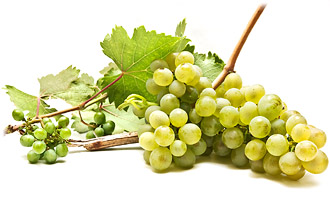 Hello Kraus,
Hello Kraus,
I made 5 gallons of grape juice by using a steam juicer. In this process the stems were still attached to the grapes. Do I need to do anything special from the normal wine making process? I was told the stems contain pectin and may require additives.
Thank you,
Henry
———-
Hello Henry,
I believe what your friend was referring to is the tannin that is in the stems of the grapes. Tannin is also found in the seeds and skins.
Some tannin in wine is a good thing. It helps the wine to clear after fermentation, and it helps to keep the wine stable while it is in the bottle. But too much tannin can cause the wine’s flavor to become extremely dry and puckering, particularly in its finish. Too much tannin can also cause a bottle of wine to develop dark dusty deposits over time. This is the excess tannin dropping out of the wine.
For these reasons wineries do not want there wines to be overcome with tannins. While they do allow a few pieces of stems to get into the wine, a huge majority of them are removed by processing the grapes through a grape destemmer. This is something that is done even before the grapes are ran through the grape presses.
In the case of your homemade grape wine, your friend’s concerns may be well founded. It depends on how much stem was actually put in the steam juicer. If you are talking about the little short pieces that are attached to the grape, then there is no issue. If you are talking about whole clusters of grapes being put in the steam juice, stem and all, then there may very well be an issue.
What should be done at this point is you should go ahead and make the wine. Any excess tannin will not be a detriment to the wine at this point. Once the fermentation has completed and you have racked the wine off the yeast and any fruit particles, then you can begin to address the potential of having too much tannin in the wine.
Bentonite is a great way to remove tannin from a homemade grape wine. It is a fining agent that removes excess proteins, tannin being on of them. I would recommend treating the wine with it at this point. Just follow the directions that come with our Speedy Bentonite.
Rack the wine off the new sediment and then let it age in bulk for at least three months. Be sure that the container is the right size and does not have a lot of head-space, like a carboy or similar. Also, treat the wine with sulfites. This should always be done before bottling a wine or when leaving a wine to rest bulk.
After aging, you should be able to taste the wine and see where you are at. It is possible that the wine may need a second treatment of bentonite, but my guess is that one treatment will be enough to resolve any issues that the steam juicer may have caused with the stems.
Best Wishes,
Customer Service at Adventures in Homebrewing
———————————————————————————————————
Ed Kraus is a 3rd generation home brewer/winemaker and has been an owner of E. C. Kraus since 1999. He has been helping individuals make better wine and beer for over 25 years.

The first time I used my steam juicer, I tossed in the grapes (Concord grapes just for juice, not wine) with the stems. The juice that resulted from this was so unpalatable, we could not drink it. I would worry that the finished wine could be affected by that unpleasant taste. Would the process of making the wine get rid of that "vegetable" flavor?
Erin, I don’t know for sure, but it is not likely that making wine from this juice would help to improve it. In fact, once you take the sugar from the juice and turn it into alcohol, it’s my bet that it will taste even worse.
I did the same thing 20 years ago. The concord grape juice was very stringent on the tongue, leaving your mouth feeling like it had been washed in acid. I canned the whole batch. A year later, the grape juice was remarkably good, and there were large crystals in the bottom of the quart jars. Two years later, the crystals were larger and the grape juice was delicious. I’m still not sure what was contained in those crystals, but I know it was the "bad stuff."
I use an aluminum steamer to juice all my fruit for jellies and canning, Do I have to worry about aluminum toxicity in any juice or wine? Will it affect the taste of the wine in any way?
Brenton, we actually recommend using a stainless steel juicer to make wine. We used to sell an aluminum one year ago, however we discovered that the collection pan tended to pit too easily from the acid in the juice.